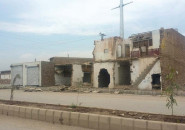Are we ready to deal with climate change?
Authorities repeat the same exercise year in and year out without paying attention to grass root problems.

Torrential rains have swept the country for a third consecutive year, submerging vast tracts of land and leaving the authorities red-faced over the inadequacy of the contingency plans laid out before the advent of monsoon.
It is likely that the changes in weather patterns may not just be a local phenomenon but a part of global climate change.
The real question, at this point, is how equipped are we to face the challenge?
Authorities carry out the repetitive exercise of counting the death toll and consolidate reports on the economic upheavals of floods and declare damage assessments.
As the government claims, civilian departments from top to bottom on a federal, provincial, district and tehsil level are once again in the field. The army has been called in to provide relief.
But truth is – and what has been observable from the past — that their mandate will not be more than rescue, relief and rehabilitation of victims.
Millions of rupees are spent on these ‘reactive’ mechanisms. However, the root cause behind the problem remains unaddressed and no tangible plans are made to minimise the devastation.
We cannot eliminate the occurrence of natural calamities but much of the damage in our case is “man made”— because of lack of planning on the part of the government and attitude of the general public.
For instance, it is known that forests play an important role in controlling floods. Less than 2.5 per cent of Pakistan, however, is under forest cover – well below the international standard which calls for one-third of a region to be forested area.
Furthermore, unchecked population growth, economic disparity, corruption at all levels has made the problem almost unmanageable.
This year’s monsoon spell, despite causing widespread devastation, is yet to fill the Tarbela and Mangla dams.
One could say that the catchment areas of these reservoirs received less rains. But who will count the water that would ultimately flow into the sea after causing widespread damage to the lives and properties of millions of people?
The situation this year is the same as the year before. In Sindh, millions were left homeless for months due to the previous flood, Haleem Adil Sheikh, adviser to Sindh chief minister told The Express Tribune.
Sheikh says that currently Sukkur and Larkana divisions are worst affected where, besides loss of dozens of lives, standing crops covering a vast area have also been destroyed.
Arshad Abbasi, an expert on the environment, blames incompetence and corruption for the current state of affairs.
According to him, no one has ever questioned the institutions like federal flood commission, which has spent over Rs72 billion since its inception in the 1970s in the name of flood mitigation programmes.
Similarly, many other such institutions, according to him, were working in the country on the public expense but their projects exist only on paper.
Published in The Express Tribune, September 11th, 2012.


















COMMENTS
Comments are moderated and generally will be posted if they are on-topic and not abusive.
For more information, please see our Comments FAQ